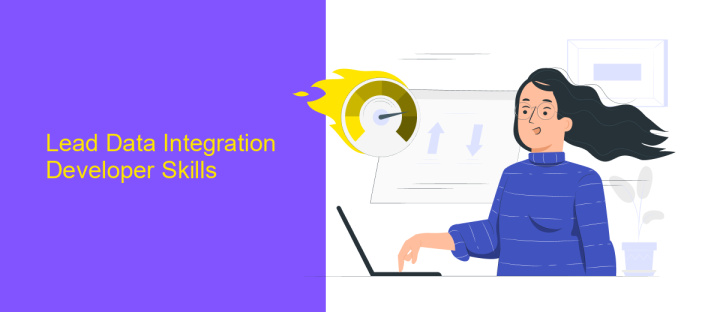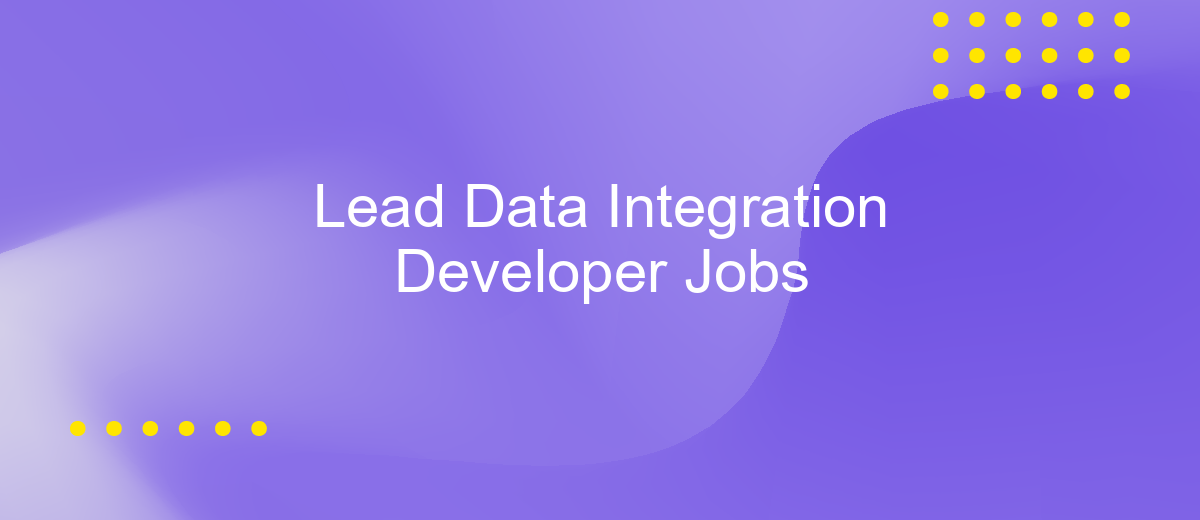Lead Data Integration Developer Jobs
The role of a Lead Data Integration Developer is pivotal in today's data-driven landscape. These professionals are responsible for designing, implementing, and managing data integration solutions that ensure seamless data flow across various systems. This article explores the key responsibilities, required skills, and career prospects for Lead Data Integration Developers, providing valuable insights for those looking to advance in this dynamic field.
What is a Lead Data Integration Developer?
A Lead Data Integration Developer is a specialized IT professional responsible for overseeing the integration of data from various sources into a unified system. They play a critical role in ensuring data accuracy, consistency, and accessibility across an organization. This position requires a deep understanding of data management, integration tools, and best practices in data governance.
- Designing and implementing data integration solutions
- Leading a team of developers and data engineers
- Ensuring data quality and consistency
- Collaborating with other departments to understand data needs
- Maintaining and optimizing data integration processes
In addition to technical skills, a Lead Data Integration Developer must possess strong leadership and communication abilities. They often act as a bridge between technical teams and business stakeholders, translating complex technical concepts into actionable business insights. This role is essential for organizations looking to leverage data for strategic decision-making and operational efficiency.
Lead Data Integration Developer Skills

A Lead Data Integration Developer must possess a robust set of technical and soft skills to effectively manage and streamline data integration processes. Key technical skills include proficiency in SQL, ETL (Extract, Transform, Load) tools, and data warehousing solutions. Familiarity with cloud platforms like AWS, Azure, or Google Cloud is crucial, as is experience with programming languages such as Python, Java, or Scala. Knowledge of API management and integration tools like ApiX-Drive can significantly enhance the ability to automate and streamline data flows between various systems.
In addition to technical expertise, strong analytical and problem-solving skills are essential. The ability to design and implement efficient data integration solutions requires a deep understanding of data architecture and data governance principles. Excellent communication and leadership skills are also necessary to coordinate with cross-functional teams and stakeholders. A Lead Data Integration Developer should be adept at project management, capable of handling multiple projects simultaneously, and ensuring timely delivery. Continuous learning and staying updated with the latest industry trends and technologies are vital for sustained success in this role.
Lead Data Integration Developer Responsibilities

The role of a Lead Data Integration Developer involves overseeing the design, implementation, and maintenance of data integration solutions. This position requires a deep understanding of data integration methodologies, tools, and best practices. The lead developer will collaborate with various teams to ensure seamless data flow and integration across systems.
- Design and develop data integration solutions using ETL tools and technologies.
- Lead and mentor a team of data integration developers.
- Collaborate with business analysts and stakeholders to gather requirements and define data integration strategies.
- Ensure data quality, consistency, and security throughout the integration processes.
- Monitor and optimize performance of data integration workflows.
- Maintain and update documentation related to data integration processes and solutions.
- Stay updated with the latest trends and technologies in data integration.
- Troubleshoot and resolve data integration issues in a timely manner.
Successful candidates for this role will have strong analytical skills, attention to detail, and the ability to manage multiple projects simultaneously. They should be proficient in various ETL tools, possess excellent problem-solving abilities, and have experience in leading technical teams. Effective communication and collaboration skills are essential for working with cross-functional teams and stakeholders.
Lead Data Integration Developer Salary

The salary for a Lead Data Integration Developer can vary significantly based on several factors, including location, experience, and the specific industry. In general, these professionals are well-compensated due to the specialized skills and knowledge they bring to an organization. Companies rely on their expertise to manage and integrate complex data systems, making their role crucial for business operations.
On average, a Lead Data Integration Developer in the United States can expect to earn between 0,000 and 0,000 per year. However, salaries can be higher in tech hubs like San Francisco, New York, and Seattle, where competition for top talent is fierce. Additionally, those with extensive experience or advanced certifications may command even higher salaries.
- Entry-level: ,000 - 0,000
- Mid-level: 0,000 - 0,000
- Senior-level: 0,000 - 0,000+
In addition to base salary, many Lead Data Integration Developers receive bonuses, stock options, and other benefits, which can significantly increase their total compensation package. The demand for skilled data integration professionals is expected to grow, making this a lucrative career choice for those with the right expertise.
Lead Data Integration Developer Job Market
The job market for Lead Data Integration Developers is experiencing significant growth, driven by the increasing need for businesses to manage and integrate vast amounts of data from various sources. Companies are seeking professionals who can lead teams in designing, developing, and maintaining complex data integration solutions. These roles often require expertise in ETL processes, data warehousing, and proficiency with integration tools and platforms. As organizations continue to adopt data-driven strategies, the demand for skilled data integration developers is expected to rise.
One of the key responsibilities of a Lead Data Integration Developer is to ensure seamless data flow across different systems. This often involves using advanced integration services like ApiX-Drive, which simplifies the process of connecting various applications and automating workflows. By leveraging such tools, developers can focus on optimizing data pipelines and improving data quality, ultimately enhancing business intelligence and decision-making capabilities. As a result, professionals with experience in using such integration services are highly sought after in the job market.
FAQ
What are the primary responsibilities of a Lead Data Integration Developer?
What skills are essential for a Lead Data Integration Developer?
What tools and technologies are commonly used in data integration projects?
How can ApiX-Drive help in automating data integration processes?
What are the challenges faced in data integration, and how can they be addressed?
Time is the most valuable resource in today's business realities. By eliminating the routine from work processes, you will get more opportunities to implement the most daring plans and ideas. Choose – you can continue to waste time, money and nerves on inefficient solutions, or you can use ApiX-Drive, automating work processes and achieving results with minimal investment of money, effort and human resources.

